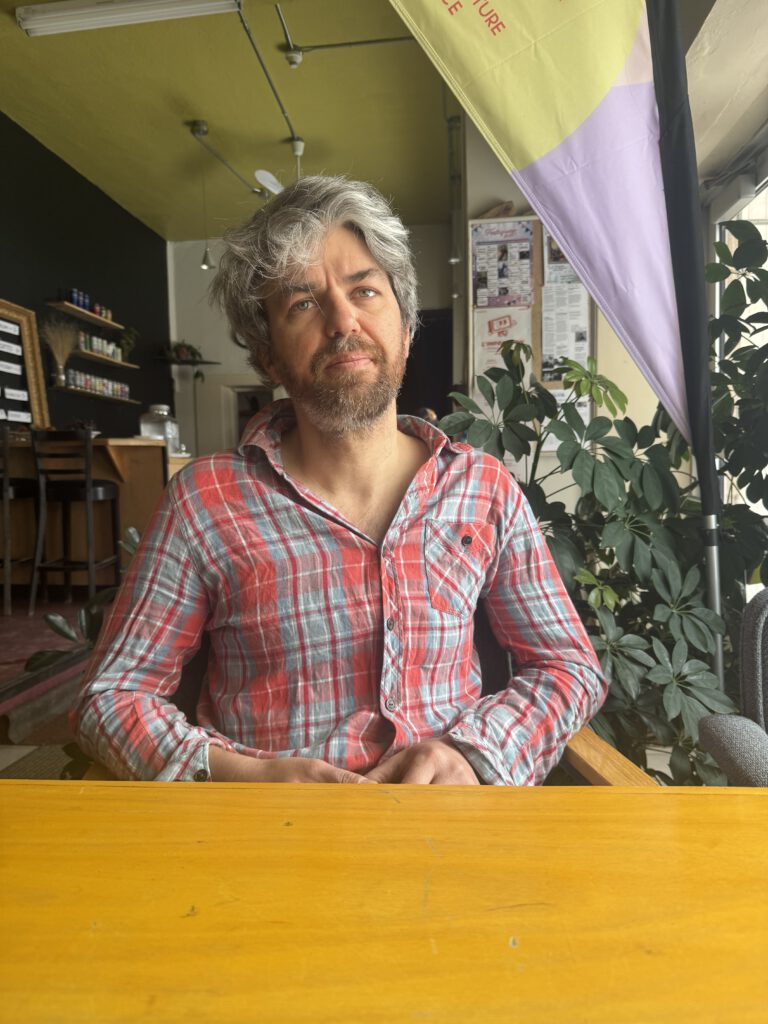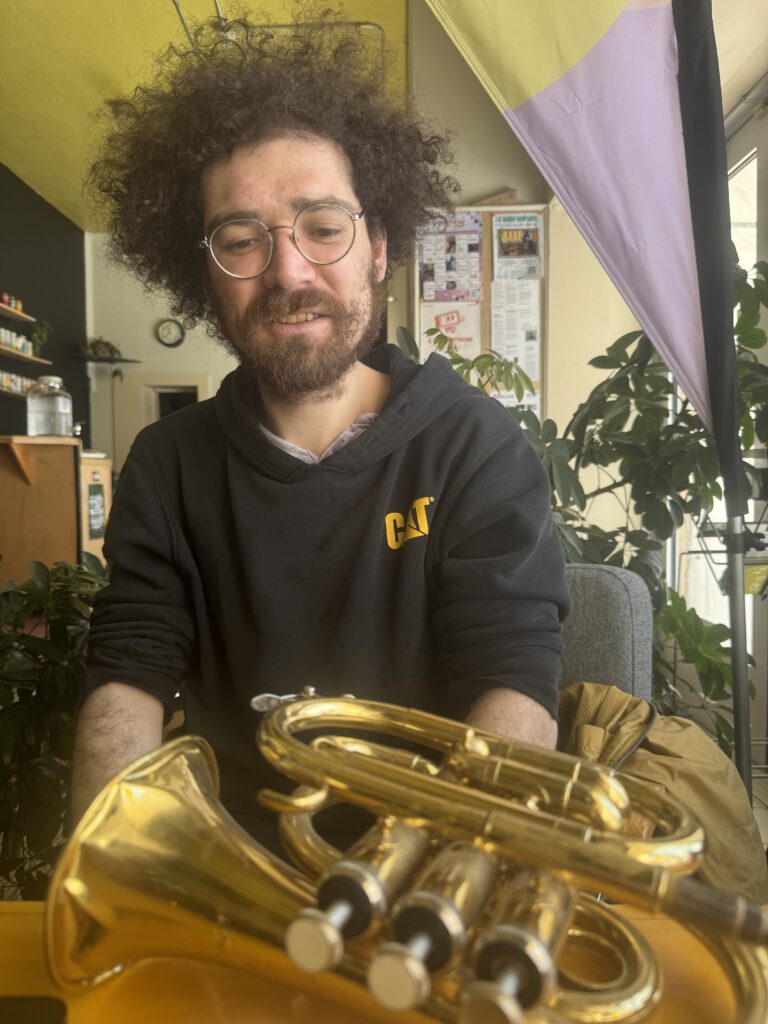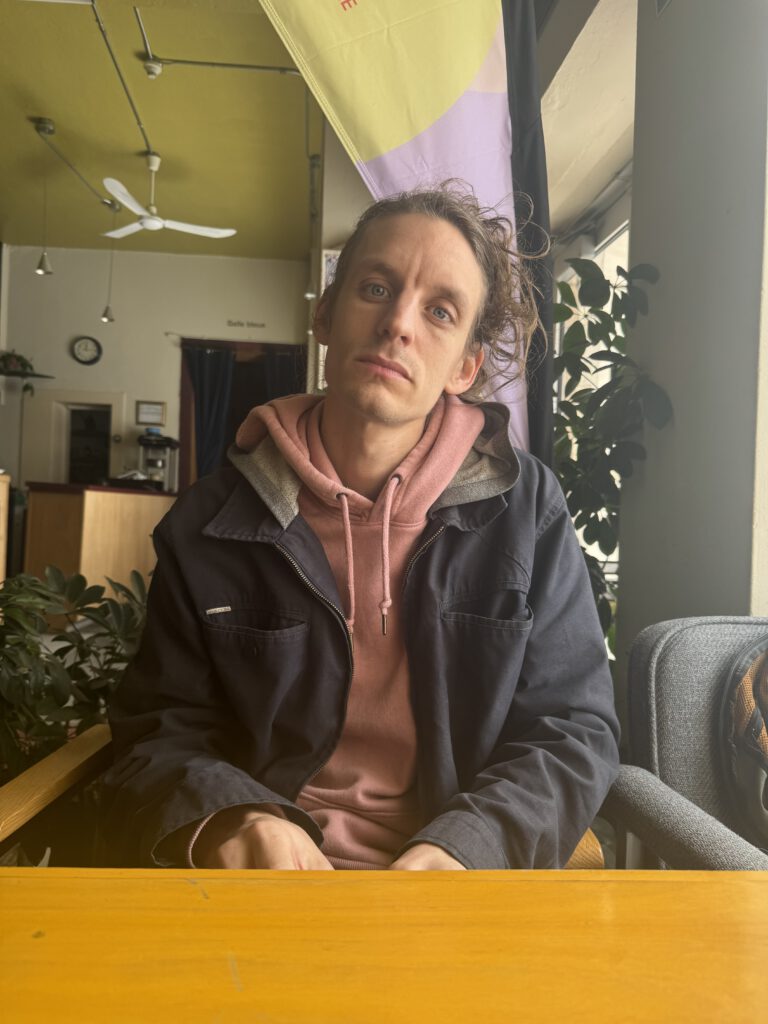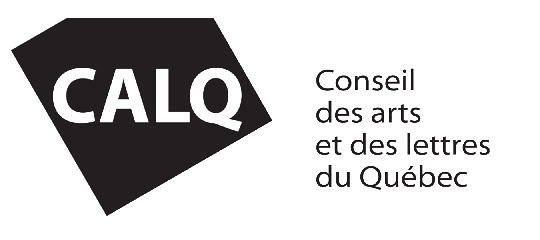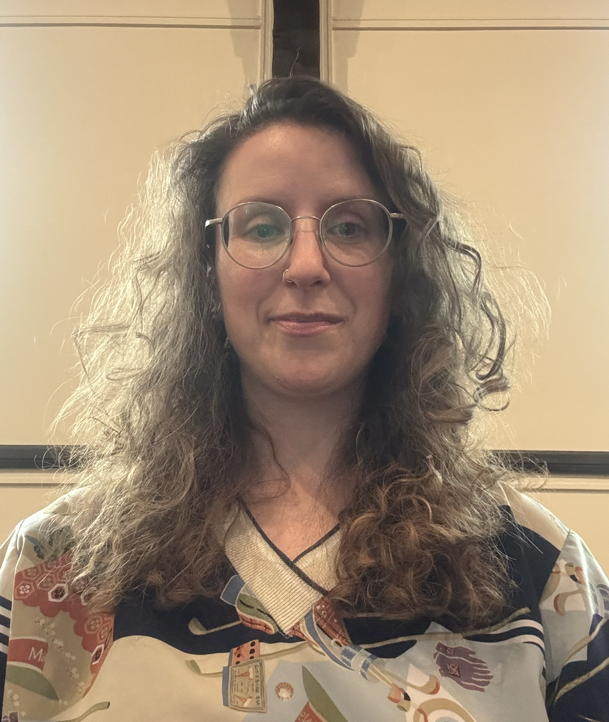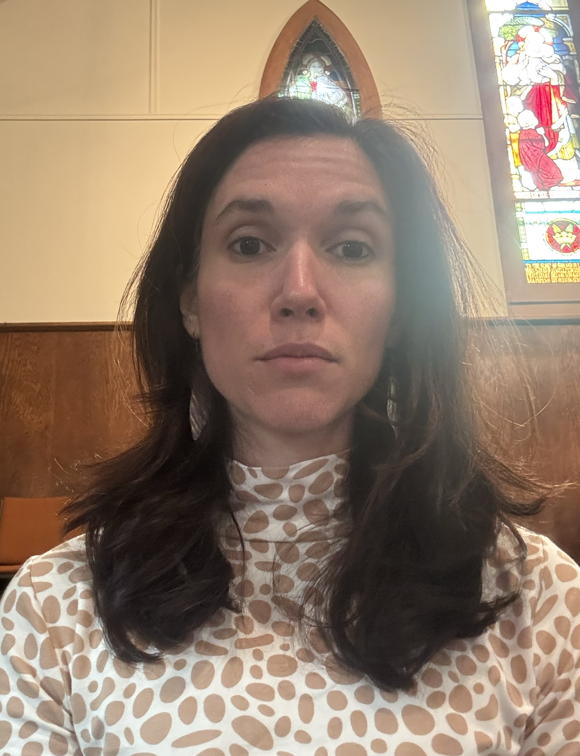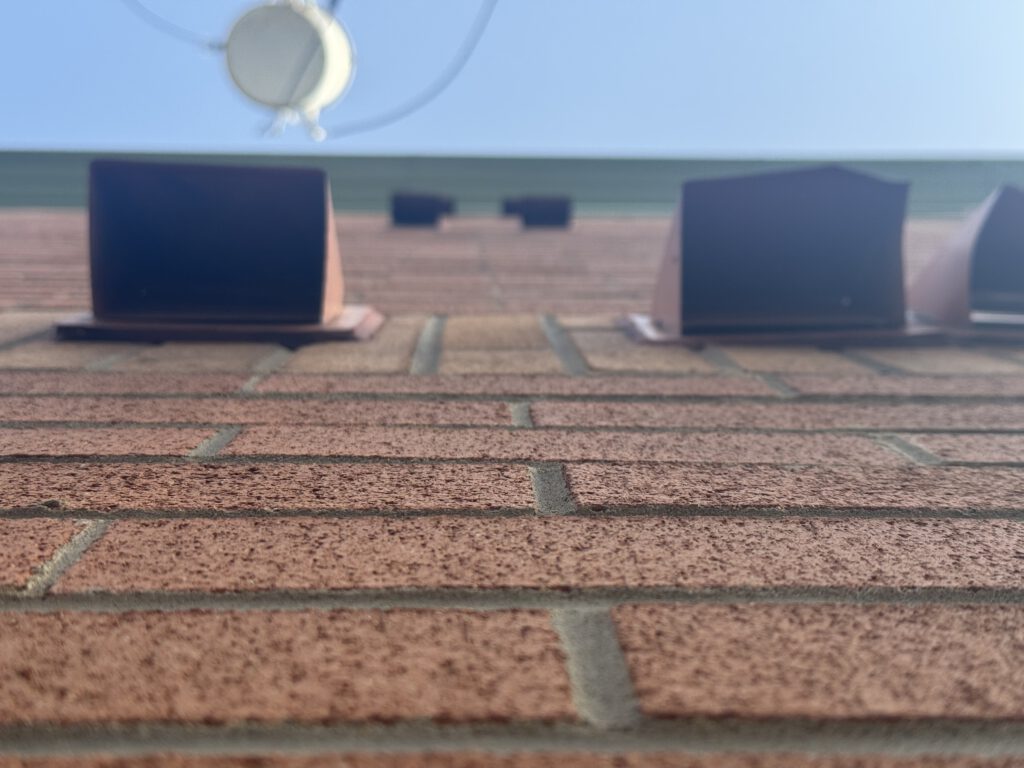
Improvisation. Composition. Recherche sonore.
L’Ensemble SuperMusique est un ensemble unique basé à Montréal, dédié à la musique actuelle, expérimentale et à l’improvisation libre. Fondé par Danielle Palardy Roger et Joane Hétu, il occupe une place centrale sur la scène de l’improvisation au Canada.
SuperMusique réunit des musicien·ne·s de générations et d’horizons variés – souvent avec des instruments préparés ou inventés –, toujours dans une approche ouverte et exploratoire du son. Le travail artistique navigue entre concepts composés et improvisation spontanée, avec une attention particulière portée à la collectivité, au risque et à la diversité des timbres.
À travers ses projets, résidences et concerts, SuperMusique crée un espace pour de nouvelles formes de création musicale – brute, vivante, imprévisible.
Les musicien·ne·s pour chaque projet sont choisi·e·s par Joane Hétu et Danielle P. Roger, en échange avec les compositeur·rice·s, à partir d’un pool d’interprètes improvisateur·rice·s. Les conditions de travail sont toujours professionnelles, c’est-à-dire que les participant·e·s sont toujours rémunéré·e·s.
Interviews:
Ensemble SuperMusique (deutsch)
Improvisation. Komposition. Klangforschung.
Das Ensemble SuperMusique ist ein einzigartiges Musikensemble aus Montréal, das sich der zeitgenössischen, experimentellen Musik und der improvisierten Klangkunst widmet. Seit seiner Gründung durch Danielle Palardy Roger und Joane Hétu ist es ein zentraler Akteur der kanadischen Improvisationsszene.
SuperMusique bringt Musiker_innen aus verschiedenen Generationen und stilistischen Hintergründen zusammen – oft mit präparierten oder selbstentwickelten Instrumenten, immer mit einem offenen, forschenden Zugang zum Klang. Die künstlerische Arbeit bewegt sich zwischen komponierten Konzepten und freier Improvisation, mit besonderem Fokus auf Kollektivität, Risikobereitschaft und klangliche Vielfalt.
Durch Projekte, Residenzen und Konzerte schafft SuperMusique einen Raum für neue Formen des Musikschaffens – roh, lebendig, unvorhersehbar.
Die Musiker_innen für jedes Projekt werden von Joane Hétu und Danielle P. Roger im Austausch mit den Komponierenden aus einem Pool von improvisierenden Interpret_innen ausgewählt. Die Arbeitsbedingungen sind stets professionell, das heißt die Beteiligten werden immer bezahlt.
Interviews:
Danielle Palardy Roger
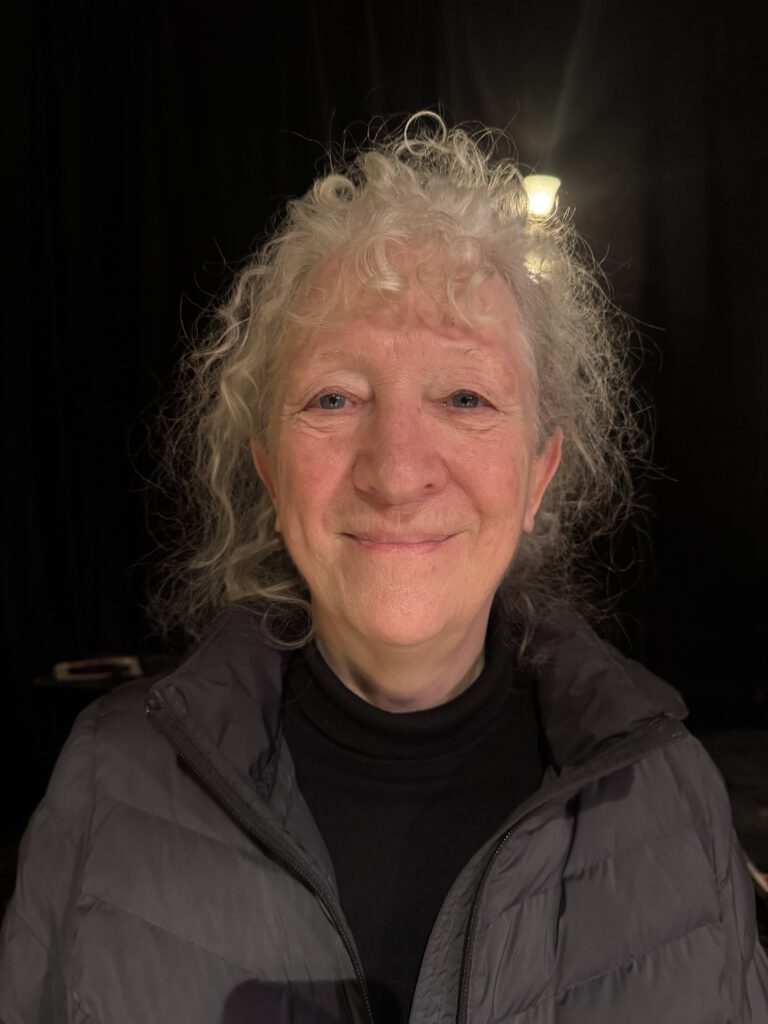
CLH: Welche Klangfarbe oder welches Klangbild ist typisch für SuperMusique? Gibt es eine erkennbare klangliche Handschrift?
Danielle: Ja, ich denke, man kann sagen, dass es eine klare Klangidentität gibt. SuperMusique ist einzigartig in Montréal – wir sind das einzige Ensemble, das sich der Improvisation und der aktuellen Musik widmet. Was besonders auffällt, ist die Vielfalt der Instrumente – viele Musiker_innen arbeiten mit präparierten oder selbst entwickelten Instrumenten. Es gibt eine ständige klangliche Forschung. Mehr als die Hälfte des Ensembles ist in dieser Erforschung „unsauberer“ Klänge aktiv – ganz im Gegensatz zu klassischen zeitgenössischen Ensembles.
Und dann ist da die starke Präsenz von Frauen. Von Beginn an haben wir im Ensemble immer auf Parität geachtet.
Und natürlich: der zentrale Stellenwert der Improvisation – rohe Improvisation, ähnlich dem, was man aus den USA oder Europa kennt. Das ist unser Sound.
CLH: Würdest du eine Aufnahme von SuperMusique wiedererkennen?
Danielle: Ja, wegen der Klangfarben, der Musiker_innen und auch wegen des Grooves. Es ist ein Ensemble mit Kraft, das keine Angst hat zu grooven – und das unterscheidet uns von anderen Gruppen hier.
CLH: Warum hast du das Ensemble gegründet?
Danielle: Ich habe es 1998 gegründet. Davor gab es WonderBrass – eine Frauengruppe – und dann Les Poules. Als diese Projekte aufhörten, hat mir etwas gefehlt. Ich wollte ein großes Ensemble gründen, um unsere Musik weiterzuführen. Beim ersten Konzert waren wir zu zehnt. Danach ist Joane dazugestoßen, und wir haben das gemeinsam aufgebaut.
CLH: Gibt es bei SuperMusique einen kollektiven oder gemeinschaftlichen Geist?
Danielle: Das Ensemble SuperMusique ist die Musik. SuperMusique Production ist die Organisation – Verwaltung, Struktur, Förderanträge. Beides gehört zusammen, ist aber voneinander getrennt.
Im Ensemble hat jedes Projekt eine künstlerische Leitung, meistens von Joane und mir gemeinsam getragen. Aber wir versuchen immer, die Ideen aller einzubinden. Auch wenn wir leiten, wollen wir, dass sich jede Person als schöpferisch erlebt. Es ist keine Hierarchie von oben nach unten, sondern eine geteilte Leitung. Wir sind kein Kollektiv im strengen Sinn, aber manchmal fühlt es sich so an.
CLH: Spiegelt sich die Geografie oder Gesellschaft Montréals in eurer Musik?
Danielle: Im Jahr 2000 haben wir ein Projekt über den Fluss und die Nebenflüsse gemacht – das hat unseren Klang beeinflusst. Heute ist das diffuser. Montréal ist eine ruhige, aber komplexe Stadt. Diese Stadt ist in uns. Sie ist dicht, urban – und ich bin das auch. Das prägt unsere klangliche Dichte. Ich würde sagen: Unsere Musik ist urban, aber nicht unbedingt „montréalisch“.
CLH: Ist eure Arbeit wichtig für Montréal?
Danielle: Absolut. Seit über 40 Jahren präsentieren wir aktuelle Musik, Improvisation, Geräusch, Vielfalt der Instrumente und der Menschen sowie Künstler_innen. Wir waren die Ersten, die das auch vor Institutionen vertreten haben. Und selbst wenn man uns heute manchmal als „die Unruhestifter_innen“ des Netzwerks Vivier betrachtet – es ist wichtig, dass wir existieren. Wir sind immer noch da, um diese Freiheit an neue Generationen weiterzugeben.
CLH: Ist das Publikum hier besonders?
Danielle: Experimentelle Musik hat immer ein kleines Publikum – aber ein sehr diverses: Philosoph_innen, Mathematiker_innen, junge Leute, ältere Menschen … alles ist vertreten. Das gilt nicht nur für Montréal. Aber es ist schwer, dieses Publikum wachsen zu lassen. Diese Musik ist nicht ansteckend wie ein Virus. Man muss einladen, überzeugen.
CLH: Ist improvisierte Musik für dich eher ein Ritual oder ein Werk?
Danielle: Ein Werk. Bei jedem Konzert komponieren wir live. Es ist kein Ritual – es ist unmittelbare Schöpfung.
CLH: Was ist die Verbindung zwischen Musik und Freiheit?
Danielle: Für uns ist das ein geteilter, lebendiger Akt des Schaffens. Musik „ist“ Freiheit. Sie ist ein Raum, in dem wir uns entdecken, in dem wir uns gemeinsam bewegen, ohne Hierarchie. Die Freude, gemeinsam zu spielen, sich zu überraschen – das ist eine tiefe Form von Freiheit. Für die Zuhörer_innen ist es oft eine andere Freiheit – die, wählen zu können, was man hört, sich woandershin tragen zu lassen.
CLH: Wenn du einen der Begriffe – Komposition, Konzept oder Improvisation – streichen müsstest, welchen würdest du wählen?
Danielle: Das ist schwer zu sagen. Für mich ist das Entwickeln eines Konzepts bereits Komposition. Und Improvisation ist auch Komposition. Ich kann also keinen dieser Begriffe wirklich streichen – sie gehören zusammen.
CLH: Was verbindet und was trennt Improvisator_innen?
Danielle: Was uns verbindet, ist die Freude am gemeinsamen Spielen. Was uns trennen kann, ist Autorität – oder Meinungsverschiedenheiten über das Vorgehen. Auch Stilrichtungen können trennen: mittelalterliche Musik, Neue Musik, Jazz … Aber eine Musizierform oder kulturelle Zugehörigkeit können auch verbinden. Musik hat diese Kraft.
CLH: Was ist dein Lieblingsgeräusch oder -klang?
Danielle: Vögel. Alle Vögel. Ich höre ihnen jeden Morgen zu. Sie sind intensiv, großzügig. In einem anderen Leben wäre ich gern ein Vogel.
CLH: Gibt es eine besondere Note für dich?
Danielle: Das B (Si bémol). Es taucht instinktiv immer wieder in meinen Kompositionen auf.
CLH: Ein Lieblingsintervall?
Danielle: Quarten und übermäßige Quarten. Ich habe sogar ein Stück dazu geschrieben. Diese Intervalle bringen mich tief zum Schwingen.
Joane Hétu
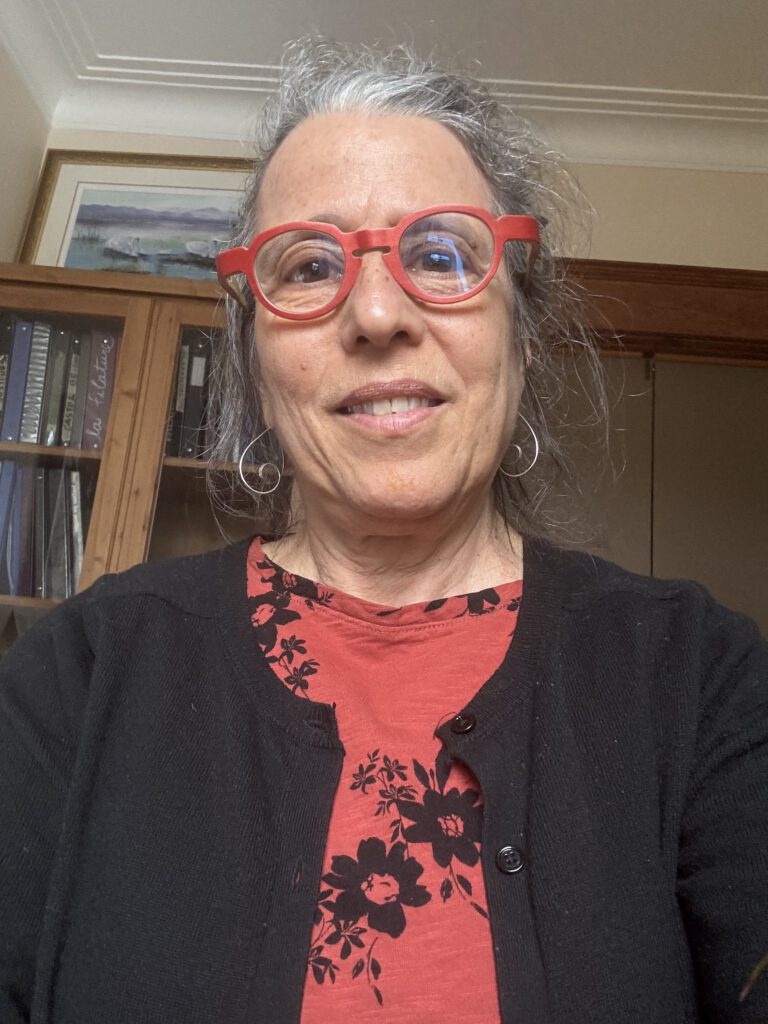
CLH: Gibt es ein typisches Klangbild bei SuperMusique? Könnte man den Klang wiedererkennen?
Joane: Das ist schwer zu sagen. Das Ensemble – das sind vor allem Danielle und ich. Wir wählen die Musiker_innen aus. Die Projekte sind sehr unterschiedlich, und da SuperMusique eine Formation mit variabler Besetzung ist, sind nie ganz dieselben Leute dabei. Vielleicht erkennt man einzelne Stimmen wieder, aber es gibt keinen einheitlichen Klang von SuperMusique. Was ich manchmal vermisse, ist ein Stolz bei den Musiker_innen, Teil von SuperMusique zu sein. Das Zugehörigkeitsgefühl ist schwer zu festigen.
CLH: Wer entscheidet darüber, wer zu diesem Pool an Musiker_innen gehört?
Joane: Danielle und ich. Manchmal auch gemeinsam mit dem_der Projektleiter_in. Aber meistens sind wir es, die in Abstimmung mit den Anforderungen des Projekts auswählen. Wir passen das Ensemble an die Wünsche des_der Komponist_in an.
CLH: Würdest du sagen, SuperMusique hat eine künstlerische Identität?
Joane: Ja, ich würde sagen, es gibt eine Haltung, eine bestimmte Arbeitsweise. Wir arbeiten sehr viel kollaborativ: Leitung, Komponist_innen und Interpret_innen haben gleichwertige Rollen. Das dauert länger, aber es schafft echte künstlerische Freiheit.
CLH: Gibt es dennoch ein Gemeinschaftsgefühl in den kreativen Momenten?
Joane: Ja, SuperMusique hat dazu beigetragen, eine Community rund um improvisierte Musik in Montréal aufzubauen. Wir waren ein wichtiger Motor – zusammen mit mercredimusics, den Mardis Spaghetti, dem GRRIL … Auch wenn kein einheitlicher Klang entstanden ist, haben sich die Verbindungen verstärkt. Und wir bitten die Komponist_innen ausdrücklich, mit dieser Community zu arbeiten.
CLH: Gibt es für dich einen typischen Klang von Montréal?
Joane: Der Spatz. Dieser Vogel, der ein bisschen schief singt. Jedes Mal, wenn ich nach Montréal zurückkomme, höre ich ihn – das ist für mich wie die akustische Signatur der Stadt.
CLH: Beeinflusst die Geografie oder die Gesellschaft Montréals eure Musik?
Joane: Ja, absolut. Montréal hat es dieser Musik ermöglicht zu existieren – durch öffentliche Förderung, durch lange Zeit bezahlbare Mieten. Es war möglich, hier zu bleiben, ohne reich zu sein. Das ändert sich gerade, aber das hat eine große Rolle gespielt.
CLH: Ist eure Arbeit wichtig für die Stadt?
Joane: Ich glaube schon, aber sie wird nicht wirklich anerkannt. Wir werden nicht wertgeschätzt, wir gehören nicht zu den offiziellen kulturellen Referenzen in Québec. Das ist ein bisschen traurig. Im Ausland kennt man uns manchmal besser als hier.
CLH: Ist das Publikum in Montréal anders als anderswo?
Joane: Es ist ein kleines, aber treues Publikum. Walter Boudreau sagte einmal, in Montréal gäbe es etwa 5000 Musikliebhaber_innen für zeitgenössische, elektroakustische oder improvisierte Musik. Das ist wenig, und es sind fast immer dieselben Leute, die zu den Konzerten kommen.
CLH: Gibt es einen Zusammenhang zwischen eurer Musik und Freiheit?
Joane: Ja. Ich arbeite gern in Co-Kreation, wo sich Musiker_innen mit ihrer eigenen Sprache ausdrücken können. In der Improvisation sagt man den anderen nicht, was sie tun sollen. Aber man muss aufpassen, die Freiheit der anderen nicht zu erdrücken. Das ist ein wertvolles Gleichgewicht.
CLH: Wenn du einen der drei Begriffe streichen müsstest – Komposition, Konzept oder Improvisation –, welcher wäre es?
Joane: Ich würde Komposition und Improvisation behalten. Ich würde das Konzept streichen.
CLH: Was verbindet Improvisator_innen – und was trennt sie?
Joane: Das ist wie im Leben: Man möchte nicht mit jeder Person zu Abend essen. Manchmal mag man nicht mit jemandem improvisieren – und das kann sich wieder ändern. Momentan gibt es in Montréal kaum klar getrennte Schulen. Wir sind eher eine große gemeinsame Welle. Und vieles läuft sehr instinktiv.
CLH: Und dein aktueller Lieblingsklang?
Joane: Vokale Klänge, Mundgeräusche. Ich habe sogar einen Chor gegründet, der mit genau solchen Klängen arbeitet.
CLH: Eine besondere Note für dich?
Joane: Ich spiele Altsaxophon und singe ebenfalls in dieser Lage. Alles, was in dieser Stimmlage liegt, resoniert besonders stark mit mir.
CLH: Und ein Lieblingsintervall?
Joane: Der Ganzton. Ich liebe die große Sekunde. Ich liebe es, wenn zwei Stimmen oder Instrumente im Abstand eines Tons miteinander klingen.
Jean Derôme
CLH: Welche Klangfarbe oder welches Klangbild gibt es in der Musik von SuperMusique? Würde man zum Beispiel eine Aufnahme im Radio als SuperMusique erkennen?
Jean: Das ist schwer zu definieren. Aber man erkennt eine Musik, die Improvisator_innen einbezieht, eine nicht vollständig ausgeschriebene Musik, mit Raum für Improvisation. Ich glaube, man hört den Unterschied zwischen komponierter und improvisierter Musik.
SuperMusique liegt dazwischen: Es ist Komposition für Improvisator_innen. Das allein grenzt uns schon stark von vielen anderen Ensembles ab. Vielleicht könnte man es also wiedererkennen. Ich glaube, ich würde es erkennen.
CLH: Weil du die Musiker_innen kennst?
Jean: Ja. Es sind die Musiker_innen, die den Klang prägen. Aber nicht unbedingt in den Stücken – im freien Spiel ist das deutlicher. Da kann jede_r die eigene Stimme voll entfalten, jede Entscheidung im Moment treffen.
In den Stücken von SuperMusique bringen wir auch die Gedanken eines_einer Komponist_in zur Geltung. Wir sind Interpret_innen. Das ist nicht dieselbe Art von Freiheit.
CLH: Also ist für dich der Unterschied zwischen freier und strukturierter Improvisation grundlegend?
Jean: Ja, absolut. In der freien Improvisation bin ich für Zeit, Einsatz und mein Spiel verantwortlich. Ich kann mein Instrument oder meinen Zugang ändern.
In einem Stück spiele ich nach einer vorgegebenen Spielweise. Wenn man Schach spielt, hält man sich an die Regeln. Freie Improvisation dagegen ist offen. Man könnte alles tun – auch wenn man das in Wirklichkeit nie tut. Es ist einfach zu schwer!
CLH: Ist SuperMusique eine Gemeinschaft, ein Kollektiv? Wer trifft die Entscheidungen?
Jean: Danielle und Joane übernehmen die künstlerische Leitung. Aber sie benennen auch andere Leiter_innen für bestimmte Abschnitte oder Konzerte. Das gehört zu ihrer Vision des Ensembles.
Manchmal gibt es mehrere Leiter_innen innerhalb eines Konzerts. Jede Person kann für eine Sektion verantwortlich sein. Aber es sind Danielle und Joane, die den Gesamtrahmen steuern.
CLH: Ist das eine eher formelle Struktur?
Jean: Ja – besonders im Vergleich zu Konzertreihen wie „Mercredi Musique“, die nie Fördermittel bekommen haben. SuperMusique hat ein Büro, bezahlte Mitarbeiter_innen, eine visuelle Identität.
Das dient auch der Anerkennung durch die Institutionen. Das Wort „Improvisation“ wird in politischen und kulturellen Kontexten nicht gern gehört – es macht Fördergeber_innen nervös. Man muss ein strukturiertes Projekt präsentieren. Das ist schade, aber so ist es nun mal.
CLH: Hat Montréal für dich einen typischen Klang?
Jean: Der Zug der Wildgänse. Und früher – der Ruf des Ziegenschlafvogels, ein Vogel, der heute fast verschwunden ist. Diese Klänge sind für mich sehr typisch für Montréal.
CLH: Prägen Geografie oder Gesellschaft Montréals eure Musik?
Jean: Ja. Montréal ist eine Insel – wir sind ein bisschen anders. Meist merkt man das erst beim Reisen. An anderen Orten waren die Leute überrascht von unserer Musik.
Die aktuelle Musik hier vermischt Stile, Referenzen – Folklore, Jazz, Humor – es ist weniger akademisch. Aber die Stile sind trotzdem noch oft getrennt. Manche kennen mich als Spieler von Lockinstrumenten, als Jazzmusiker oder Filmkomponist … das verbindet sich nicht wirklich.
CLH: Denkst du, dass eure Arbeit für Montréal wichtig ist?
Jean: Ich glaube schon. Aber ich weiß nicht, ob die Stadt das auch so sieht. Manchmal spüre ich Respekt, aber keine Liebe. Als würden wir etwas Gutes tun – das aber Angst macht. Musik kann manchmal Angst machen.
CLH: Und das Publikum – ist es typisch Montréal oder universell?
Jean: Es gibt ein kleines, treues Publikum. In Montréal sind die Leute warmherzig, spontan. Man spürt Großzügigkeit. In Berlin, Ottawa oder New York ist es kühler. Weniger Rückmeldung.
Als ich angefangen habe, gab es manchmal heftige Reaktionen. Leute, die das Mikro abstellten oder ein Bier ins Saxophon kippten. Heute wird das mehr akzeptiert.
CLH: Was ist der Zusammenhang zwischen Musik und Freiheit bei SuperMusique?
Jean: Die Musiker_innen werden wegen ihrer Eigeninitiative ausgewählt. Selbst bei einem komponierten Stück folgen wir keinem Kuchenrezept. Wir treffen viele Entscheidungen.
Manchmal denke ich: Ich bin genauso viel Komponist wie die Person, die das Stück geschrieben hat. Ich fülle die Struktur mit meiner eigenen Sprache, meinen Klängen. Aber das ist ein Balanceakt.
CLH: Wenn du einen Begriff streichen müsstest – „Komposition“, „Konzept“ oder „Improvisation“ – welcher wäre es?
Jean: Hm … Es ist ein dynamisches Dreieck. Aber wenn ich muss: Vielleicht würde ich „Konzept“ streichen.
CLH: Was verbindet oder trennt Improvisator_innen?
Jean: Es gibt nicht nur Musiker_innen – auch Improvisation in Tanz oder Theater. Was manchmal trennt, sind persönliche Haltungen, „Sub-Schulen“, ästhetische Vorlieben.
Einige wollen mit allen spielen, andere haben spezifischere Vorlieben. Es entstehen Tendenzen, verlieren an Energie, kehren zurück. Es ist eine ständige Bewegung, je nach Lust und Interessen.
CLH: Kurze Fragen: Dein Lieblingsklang oder -geräusch?
Jean: Ich weiß nicht – es hängt vom Moment ab.
CLH: Eine Note, die dir besonders ist?
Jean: Nein, ich mag alle Frequenzen. Aber wenn mir eine Note zu sehr auf die Nerven geht … dann wechsle ich einfach das Instrument.
CLH: Ein besonderes Intervall?
Jean: Als ich jung war: die kleine Septime – wegen des Blues. Heute? Ich mag alle Intervalle.
Lori Freedman
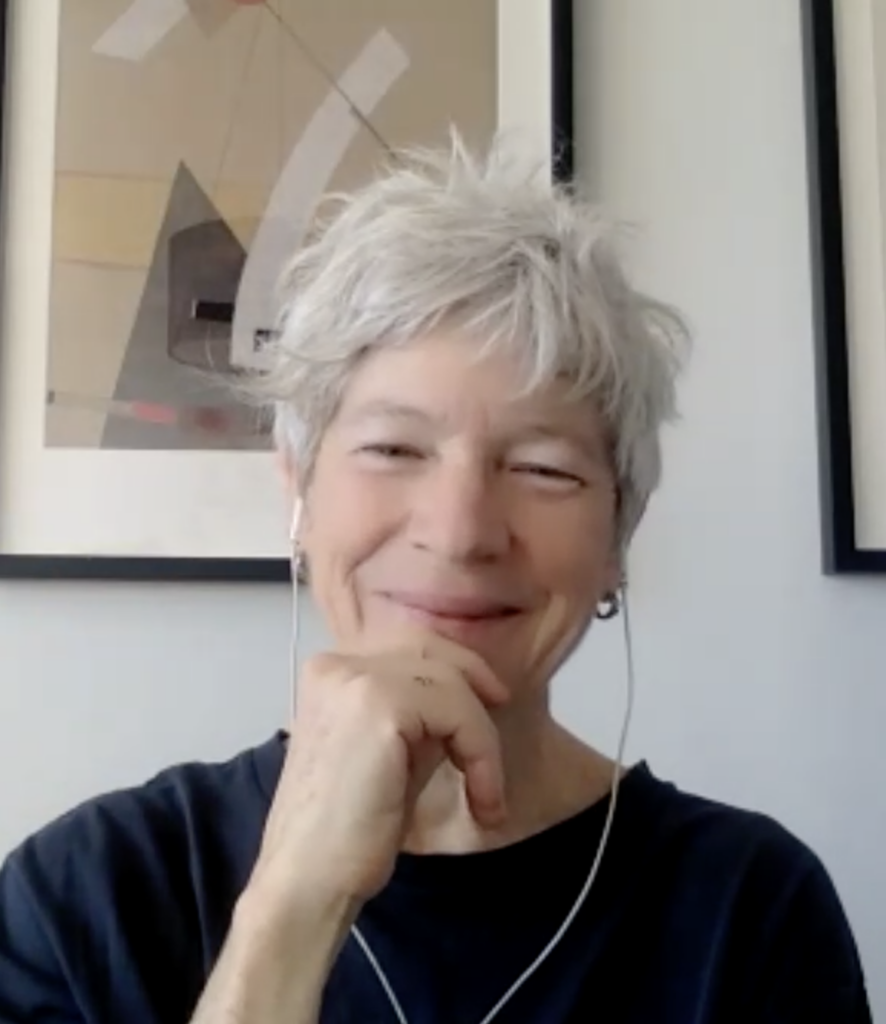
CLH: Gibt es einen typischen Klang oder ein Klangbild, das SuperMusique definiert?
Lori: Es ist ziemlich schwierig, einen bestimmten oder „typischen“ SuperMusique-Klang zu beschreiben. Die Gruppe macht so viele verschiedene Dinge – oft mit unterschiedlichen Leuten. Aber wenn ich an SuperMusique denke, denke ich sofort an Danielle und Joane – sie „sind“ SuperMusique. Wenn es also so etwas wie einen typischen Klang gibt, dann ist es der Klang der Musiker_innen, die sie jeweils für ein Stück oder Projekt zusammenstellen. Sie wählen aus einem großen, einigermaßen vertrauten Pool von Improvisator_innen – obwohl sich dieser Kreis auch verändert, wenn zunehmend jüngere Generationen einbezogen werden.
CLH: Es geht also nicht nur um das Ensemble, sondern um die Menschen, die es leiten?
Lori: Ganz gleich, wessen Konzept oder Stück aufgeführt oder geleitet wird – es sind die Musiker_innen, die es zum Klingen bringen. Und das ist der wiedererkennbare Klang: der Klang dieser Spielenden.
CLH: Spiegelt SuperMusique den Klang der Improvisation in Montréal wider?
Lori: Auf jeden Fall. SuperMusique repräsentiert „einen“ Klang der Improvisation in Montréal. Es gibt einfach zu viele Improvisator_innen in Montréal, als dass man sagen könnte, das sei der Montréal-Klang. Aber SuperMusique ist eine der am längsten bestehenden Strukturen hier – sie hat also starken Einfluss. Die Szene der improvisierten Musik in Montréal ist jedoch sehr vielfältig.
CLH: Was würdest du als künstlerische Identität von SuperMusique bezeichnen?
Lori: Neugier. Man geht Risiken ein. Es geht nicht darum, eine bestimmte Ästhetik zu wiederholen – sondern darum, neue Wege des Musikmachens zu erkunden.
CLH: Würdest du SuperMusique als Kollektiv bezeichnen?
Lori: Nicht direkt. Danielle und Joane sind eindeutig die Leiterinnen. Aber es gibt ein Gefühl von gemeinschaftlicher Gestaltung innerhalb der Projekte. Jede_r wird ermutigt, Ideen einzubringen. Es ist kein Top-down-System, aber auch nicht völlig flach – eher eine ausgewogene Form von Leitung. Aber ich glaube nicht, dass Danielle und Joane selbst SuperMusique als Kollektiv bezeichnen würden.
CLH: Gibt es ein Geräusch oder einen Klang, der für dich Montréal repräsentiert?
Lori: Die Kirchenglocken! Jeden Sonntag um zwölf – überall. Und die Sirenen – sehr anders als in Europa. Und ehrlich gesagt: die Sprachen. Früher war es in meinem Viertel fast nur Französisch, jetzt höre ich viel mehr Englisch. Dieser Wandel ist auch ein Art von Klang.
CLH: Denkst du, dass Geografie oder das soziale Gefüge Montréals die Musik beeinflussen?
Lori: Ja, absolut – und das gilt überall. Jeder Ort hinterlässt eine Spur darin, wie Menschen gestalten, zuhören, denken, sich bewegen … und atmen.
CLH: Ist die Arbeit von SuperMusique wichtig für die Stadt?
Lori: Auf jeden Fall. SuperMusique existiert seit Jahrzehnten – eine Institution, die sich auf experimentelle Kunst konzentriert. Das ist in Nordamerika an sich schon eine Seltenheit. SuperMusique schafft Raum für Experimente, für künstlerische Freiheit. Es ist mittlerweile Teil der kulturellen DNA dieser Stadt.
CLH: Und das Publikum – gibt es ein typisches Publikum für SuperMusique-Projekte in Montréal?
Lori: Jede Veranstalter_in in Montréal hat ihr eigenes Publikum – auch mit vielen Überschneidungen, also Leuten, die zu Konzerten unterschiedlicher Gruppen gehen. SuperMusique zieht ein generationsübergreifendes Publikum an. Es gibt einige sehr treue Zuhörer_innen, die nur zu SuperMusique kommen und sonst nie improvisierte Musik hören. Und gleichzeitig gibt es auch ein Improvisations-Publikum in Montréal, das nie zu SuperMusique-Konzerten geht.
CLH: Welche Rolle spielt Freiheit in der improvisierten Musik von SuperMusique?
Lori: Wenn ich Anweisungen und Rahmenbedingungen für eine Improvisation bekomme, versuche ich, sie positiv zu sehen. Sie können Probleme darstellen, die ich lösen muss. Und das hat für mich viel mit Freiheit zu tun.
Eigentlich ist meine Herangehensweise an Musik generell „Freiheit“ – im Sinn davon, dass ich mein ganzes Leben lang versuche, mir selbst die Erlaubnis zu geben, mich nicht zu zensieren, neugierig zu sein – auch vor Publikum.
CLH: Wenn du einen dieser drei Begriffe streichen müsstest – Komposition, Improvisation oder Konzept –, welchen würdest du wählen?
Lori: Ich würde „Konzept“ streichen. Improvisation und Komposition sind essenziell – und manchmal sind sie dasselbe. Beides sind direkte Wege, Musik zu machen. Ein Konzept hingegen ist kein Klangwerkzeug – es entsteht in einem anderen Teil des Körpers … dem oberen.
CLH: Was bringt Improvisator_innen zusammen – und was trennt sie?
Lori: Zuhören bringt uns zusammen. Die Bereitschaft, mit anderen im Raum zu sein – ohne zu dominieren. Was trennt? Erwartungen. Wenn jemand mit einer fertigen Idee kommt und sich nicht von anderen beeinflussen lassen will. Das ist eine Form von Zensur – und in der Improvisation ist „Nein“ das Einzige, was man als Spieler_in nicht sagen darf.
CLH: Was ist dein Lieblingsklang oder -geräusch?
Lori: Atem – wenn er langsam ist und spiralförmig.
CLH: Gibt es eine Note, die dir besonders wichtig ist?
Lori: Zum As (Gb in Konzertstimmung) fühle ich mich auf der Bassklarinette sehr hingezogen.. Dieser Ton resoniert durch mich hindurch und um mich herum.
CLH: Und ein Lieblingsintervall?
Lori: Im Moment liebe ich die ganz kleinen – weniger als ein Halbton. Mikrotönige Sekunden.
Pierre-Yves Martel
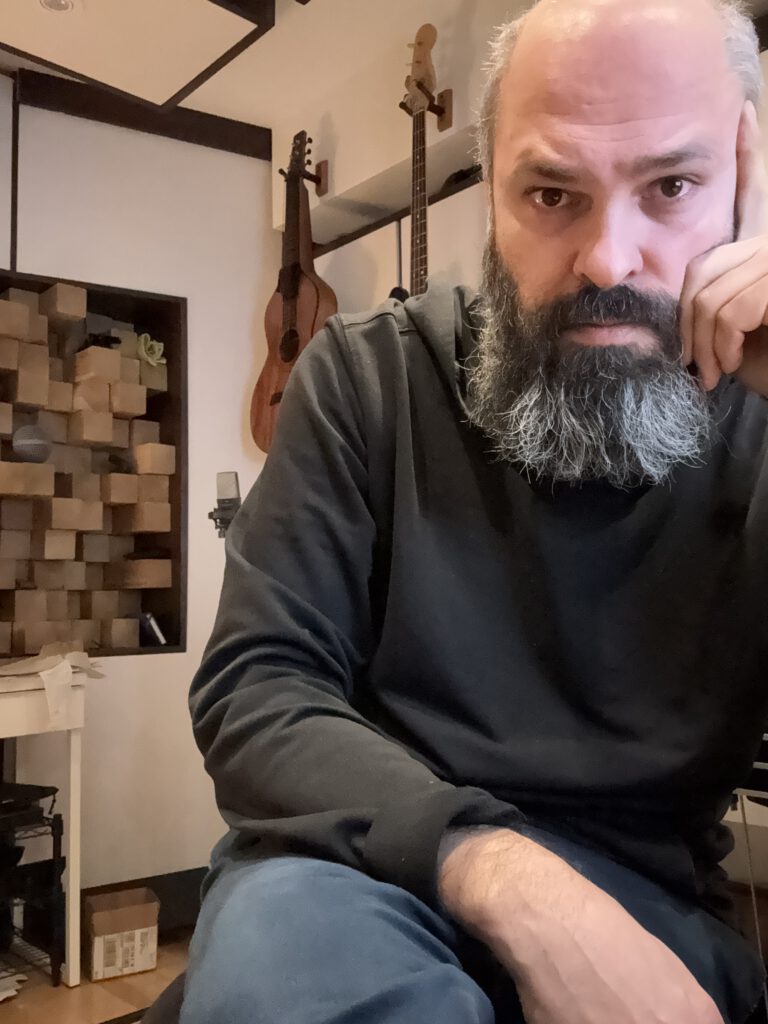
CLH: Welche Klangfarbe oder welches Klangbild hat das Ensemble SuperMusique? Gibt es eine klangliche Handschrift?
Pierre-Yves: Ich denke, das hängt vom jeweiligen Projekt ab, aber es gibt wiederkehrende Elemente: grafische Partituren, große Ensembles, das Fehlen herkömmlicher harmonischer oder melodischer Strukturen. Das hört man nicht immer sofort, aber diese Elemente tragen die Musik. Und es gibt eine Energie, ein sehr breites Klangspektrum – wie ein Kochtopf, der jederzeit überlaufen kann.
CLH: Hat SuperMusique eine eigene künstlerische Identität?
Pierre-Yves: Für mich ist SuperMusique eine kontinuierliche Komposition von Joane, Danielle und Diane seit den Anfängen. Es ist wie eine lange zeitliche Variation. Die Ästhetik stammt aus einer Tradition der 1980er-Jahre, beeinflusst vom Minimalismus und dem bewussten Einsatz begrenzter Mittel – aber es bleibt immer diese gespannte Energie, die jeden Moment hervorbrechen kann.
CLH: Ist SuperMusique ein Kollektiv?
Pierre-Yves: Nein, es ist geleitet. Es ist kein horizontales Kollektiv. Auch wenn es ursprünglich als Gegenmodell zu traditionellen Orchestern entstand, ist die Struktur davon inspiriert: mit Leitung, mit klarer künstlerischer Richtung.
CLH: Welches Geräusch ist typisch für deine Stadt, Montréal?
Pierre-Yves: Das Geräusch der Flugzeuge, die ständig über mein Viertel hinweg fliegen. Und der Gesang des Kardinals – ein Vogel, den ich oft in meinem Hof höre.
CLH: Beeinflussen die Geografie oder Gesellschaft Montréals die Musik?
Pierre-Yves: Ja. Montréal ist stark zwischen frankophonen und anglophonen Teilen aufgeteilt, und ich denke, diese Trennung spiegelt sich auch in der Musik wider. Es gibt den Wunsch, eine Identität zu schützen – besonders die sprachliche.
CLH: Ist die Arbeit von SuperMusique wichtig für Montréal?
Pierre-Yves: Ja. Wenn SuperMusique nicht existieren würde, wäre Montréal nicht das, was es ist. Es ist ein Grundpfeiler der zeitgenössischen Musik hier. Jetzt, wo Danielle über Nachfolge nachdenkt, merkt man erst richtig, wie wichtig – und wie komplex – es ist, das weiterzugeben.
CLH: Ist das Publikum in Montréal anders?
Pierre-Yves: Schwer zu sagen. Manchmal sind die Konzerte voll, manchmal leer. Vielleicht müsste man über neue Wege nachdenken, wie man Publikum anspricht. Es ist sehr unterschiedlich.
CLH: Was bedeutet Musik für dich im Hinblick auf Freiheit?
Pierre-Yves: Musik ist Freiheit. Schon die Entscheidung, einen Klang zu erzeugen, ist ein Akt der Freiheit. Ich fühle mich am freisten, wenn ich spiele, wenn ich einfach ich selbst sein kann.
CLH: Und in der Improvisation?
Pierre-Yves: Ich habe mein Vokabular, meine Gesten. Was sich verändert, ist, wie die Umgebung und die anderen mich dazu bringen, bestimmte Entscheidungen zu treffen. Diese geteilte Energie ist es, die alles lebendig macht. Eine Verschmelzung, die nicht immer geschieht – aber wenn sie eintritt, hat das einen starken Effekt.
CLH: Wenn du einen der drei Begriffe – Komposition, Improvisation, Konzept – streichen müsstest?
Pierre-Yves: Komposition. Bei SuperMusique arbeiten wir eher mit Konzepten – offen und flexibel. Komposition ist rigider. Ein Konzept lässt mehr Raum für Improvisation.
CLH: Was verbindet oder trennt Improvisator_innen?
Pierre-Yves: Das geteilte Schweigen und der geteilte Raum – sie ermöglichen es, gemeinsam etwas entstehen zu lassen. Trennend wirkt es, wenn jede_r in seiner_ihrer eigenen Blase bleibt, ohne wirklich zuzuhören oder zu interagieren.
CLH: Was ist dein Lieblingsklang?
Pierre-Yves: Der Wind. Jede Art von Wind. Er ist einfach und lebendig – und er kehrt immer wieder.
CLH: Gibt es eine Note, die dir besonders wichtig ist?
Pierre-Yves: Das D. Es ist der zentrale Ton bei meinen Instrumenten, besonders präsent in den Obertönen von Saiteninstrumenten.
CLH: Ein besonderes Intervall?
Pierre-Yves: Die Sekunde – besonders die große. Ich liebe diesen Unschärfebereich, dieses Spiel mit der Septime und der None.
Scott Thomson
Hier ist die deutsche Übersetzung des Interviews mit Scott, sorgfältig übertragen mit musikalischem und stilistischem Feingefühl:
CLH: Was für ein Klangbild erzeugt SuperMusique? Gibt es einen wiedererkennbaren Sound?
Scott: Ja. SuperMusique kombiniert immer elektronische und akustische Instrumente. Diese Synthese prägt den Klang. Außerdem ist es ein Ensemble mit variabler Geometrie – die Besetzung wechselt je nach Projekt, aber es gibt wiederkehrende Schlüsselpersonen wie Joane Hétu, Danielle Palardy Roger, Diane Labrosse, Jean Derome, Bernard Falaise und andere. Der Klang wird durch diese Improvisator_innen geformt – durch die Art, wie ihre individuellen Stile durch die Kompositionen hindurchscheinen. Dirigieren ist ein weiteres Element: Joane, Danielle und Jean dirigieren alle mit ähnlichen Gesten, aber sehr unterschiedlichen Ergebnissen.
CLH: Würdest du eine Aufnahme von SuperMusique wiedererkennen?
Scott: Ich glaube schon. Ich würde die einzelnen Improvisator_innen erkennen – ihre Stimmen sind sehr charakteristisch. Die Art, wie sie miteinander interagieren, gibt der Gruppe ihre Identität.
CLH: Die künstlerische Identität ergibt sich also aus den Persönlichkeiten?
Scott: Genau. Es kommt darauf an, wer spielt und wie. Das verleiht der Gruppe Kontinuität, auch wenn sich die Besetzung ändert.
CLH: Klingt improvisierte Musik in Städten wie Montréal, Québec oder Rimouski unterschiedlich?
Scott: Auf jeden Fall. Es hängt davon ab, wer spielt und wie oft. Orte wie Rimouski haben durch Wiederholung ihren eigenen Charakter entwickelt – Musiker_innen, die über längere Zeit miteinander spielen und gemeinsame Instinkte entwickeln. Montréal ist durchlässiger, aber trotzdem unverwechselbar.
CLH: Was prägt diese lokalen „Vibes“?
Scott: Es ist wie ein großartiges Abendessen – schwer zu beschreiben, aber man spürt, wenn es stimmt. Diese Chemie wird zu Klang. In kleineren Städten ist diese Chemie oft intensiver, weil die Leute häufiger miteinander spielen.
CLH: Ist SuperMusique ein Kollektiv?
Scott: Nicht wirklich. Es gibt künstlerische Co-Leiter_innen, die Entscheidungen treffen – sehr professionell. Aber es besteht eine enge Verbindung zur informellen Szene der improvisierten Musik. Diese informelle Szene ist entscheidend: Sie bringt neue Musiker_innen hervor, die später in größere Projekte einsteigen. Es gibt eine Art Ökologie – ein Gleichgewicht zwischen formellen und informellen Räumen.
CLH: Was verändert sich durch Professionalisierung?
Scott: Sie verändert die Musik. SuperMusique konzentriert sich auf komponierte Werke, die Improvisator_innen einbeziehen – nicht auf freie Improvisation im engeren Sinn. Die Intention ist eine andere: Es geht darum, ein Werk gut zu präsentieren, nicht unbedingt darum, Freiheit auszudrücken.
CLH: Besteht also keine Verbindung mehr zwischen SuperMusique und Freiheit?
Scott: Persönlich – nein. Es geht eher um Verantwortung. Ich fühle mich in diesen Projekten nicht „frei“ als Spielender, aber ich versuche Stücke zu schaffen, die Raum für Ausdruck lassen. Ich „gebe“ keine Freiheit – ich nehme sie nur nicht weg. „Frei“ ist ein sehr politischer Begriff. Ich finde den Gedanken interessant, ihn durch „verantwortete improvisierte Musik“ zu ersetzen. Das sagt mehr über die dahinterstehenden ethischen Haltungen aus.
CLH: Hat Montréal für dich einen typischen Klang?
Scott: Ja. Als ich von Toronto hierherzog, fiel mir sofort das Klingeln der Fahrradklingeln auf. Toronto war von Straßenbahnen geprägt, aber Montréal – das sind Fahrräder. Es ist leiser, weicher, menschlicher im Maßstab. Dieser physische Raum und das Tempo beeinflussen, wie die Menschen leben und spielen.
CLH: Beeinflusst Geografie die Musik?
Scott: Absolut. Musiker_innen in Montréal leben näher beieinander. Es ist günstiger als Toronto, also bleiben die Leute verbunden. Man kann zu Fuß zu Proben oder Auftritten gehen. Diese Nähe fördert Beziehungen und erleichtert Kollaboration.
CLH: Ist SuperMusique wichtig für Montréal?
Scott: Objektiv betrachtet vielleicht nicht. Es ist eine kulturell marginale Praxis. Aber wir sind da – und was wir tun, hat internationale Bedeutung. Montréal profitiert davon, auch wenn es das nicht immer erkennt.
CLH: Ist das Publikum in Montréal anders?
Scott: Das hängt vom Kontext ab. Es gibt kein „typisches“ Montréal-Publikum. In kleineren Städten wie Rimouski oder Victoriaville sind die Zuhörer_innen oft generalistischer – sie interessieren sich für alle Arten von Kunst. In Montréal ist es oft spezialisierter.
CLH: Wenn du einen der drei Begriffe – Komposition, Improvisation, Konzept – streichen müsstest?
Scott: Schwierig. Aber ich würde zögernd *Konzept* sagen. Ich arbeite als Komponist viel mit konzeptuellen Ansätzen, und sie sind bei SuperMusique willkommen. Aber insgesamt sind Komposition und Improvisation zentraler für das Ensemble.
CLH: Was vereint die Musiker_innen?
Scott: Die Struktur und die künstlerische Leitung. Sie bringen Menschen zusammen, die sonst vielleicht nie miteinander spielen würden. Mit der Zeit entsteht durch gemeinsame Erfahrungen eine Verbundenheit – selbst wenn die Besetzung wechselt. Das gehört zur musikalischen Ökologie.
CLH: Und was trennt sie?
Scott: Auch die Struktur. Mit unbekannten Kolleg_innen zusammenzuspielen kann Unterschiede betonen. Aber Improvisator_innen leben oft von solchen Unterschieden. Spannung kann zu Entdeckung führen.
CLH: Was ist dein Lieblingsklang?
Scott: Der nächste Klang, den ich hören werde.
CLH: Gibt es eine Note, die dir besonders ist?
Scott: Es. Auf meinem Instrument hat diese Note eine Art „Blüte“. Sie resoniert besonders schön.
CLH: Und ein Lieblingsintervall?
Scott: Oktaven. Im Moment bin ich total auf Oktaven fixiert. Aber das kann sich wieder ändern.
